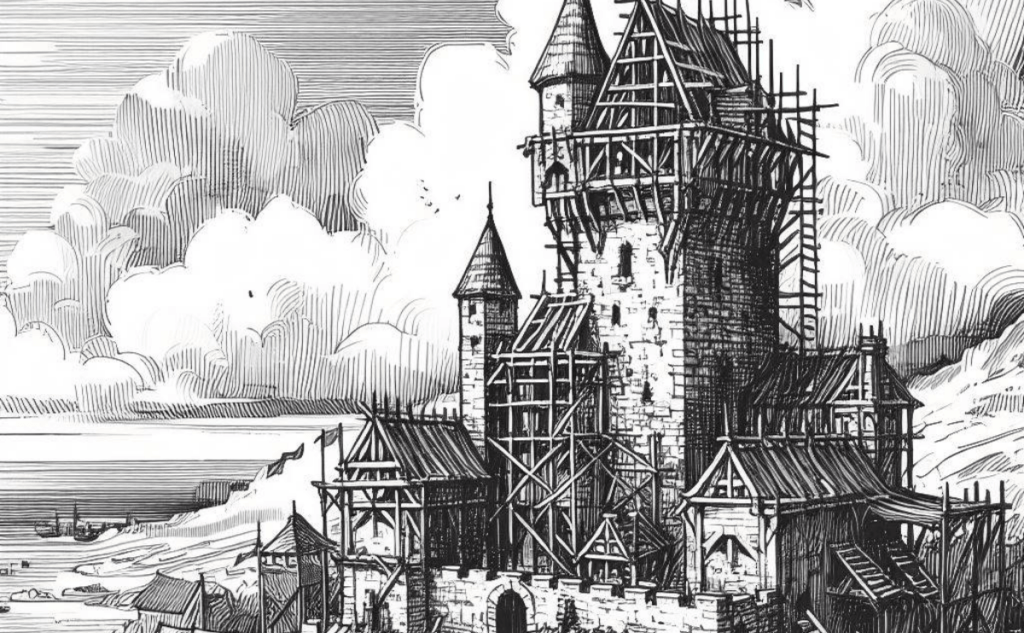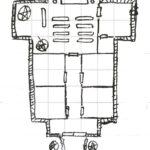
As your adventures bring renown and riches, the call for a permanent base of operations may beckon. Perhaps you dream of a towering keep, a bustling tavern that doubles as a headquarters, or even the restoration of a forgotten temple, imbued with history and potential. Securing or constructing a stronghold transcends mere acquisition – it represents a monumental step in your legacy, a place to store your hard-earned treasures, train your loyal companions, and establish your presence in the world. Whether you seek a fortified bastion against encroaching threats or a haven that fosters camaraderie and shared purpose, the path to acquiring your stronghold is an exciting challenge in itself.
Benefits of Strongholds:
While strongholds require significant upkeep, they offer several advantages:
- Safe Haven: A secure location to store valuables, rest troops, and plan future adventures.
- Resource Generation: Strongholds with farms, workshops, or trade routes can generate income to offset upkeep costs.
- Strategic Advantage: Strongholds can serve as a base of operations, providing a central location for the party and potential recruiting grounds for followers.
Stronghold Upkeep:
The base upkeep cost for a stronghold is determined by its size and location.
Size:
- Small (Ruined Watchtower, Modest Manor): 10 gp/day
- Medium (Fortified Keep, Bustling Tavern): 20 gp/day
- Large (Extensive Castle Complex, Sprawling Monastery): 30 gp/day
Location:
Modifiers are applied to the base cost based on the stronghold’s location:
- Remote Location (+2 gp/day): Difficulty acquiring supplies increases costs.
- Urban Center (-1 gp/day): Access to markets and services reduces costs.
- Hazardous Environment (+5 gp/day): Harsh terrain or dangerous regions require additional upkeep for maintenance and security.
Complexity Modifiers:
Additional features can further increase upkeep costs:
- Fortifications (Walls, Gates): +2 gp/day
- Specialized Facilities (Hospitals, Libraries): +3 gp/day
- Extensive Grounds (Gardens, Training Grounds): +1 gp/day per acre
Example: A character owns a Medium-sized Fortified Keep (+2 gp) located in a Remote Location (+2 gp). The base cost is 20 gp/day, modified by the location and features for a total upkeep cost of 24 gp/day.
Staffing Costs:
The number and type of staff required for a stronghold will vary depending on its size and complexity. Here’s a guideline for common staff positions and their associated daily wages:
- Guards (Basic): 2 gp/day
- Skilled Guards (Veterans): 4 gp/day
- Servants (Cleaners, Cooks): 1 gp/day
- Artisans (Blacksmiths, Scribes): 5 gp/day
- Steward (Manages Staff and Supplies): 10 gp/day
Example: The Medium-sized Fortified Keep from the previous example might require 4 basic Guards (8 gp/day), 2 Servants (2 gp/day), and a Steward (10 gp/day) for a total daily staff cost of 20 gp/day.
Resource Management
Transforming your hard-won wealth into a permanent stronghold is a significant achievement, but the responsibility doesn’t end there. Maintaining a fortified keep, bustling tavern, or even a restored temple requires a steady stream of coin. Fortunately, strongholds aren’t simply drains on your resources – with careful planning and effort, they can become self-sustaining enterprises. This section delves into the art of Resource Management, exploring various means of generating income to offset the upkeep costs associated with your stronghold. From cultivating fertile lands to establishing lucrative trade routes, you’ll discover strategies to turn your stronghold into a financial powerhouse, ensuring its continued prosperity and solidifying your legacy in the world.
Production
Type of Production: Different resources offer varying income potential.
- Farms (Small): Vegetables, Fruits, Livestock (1-3 gp/day)
- Farms (Large): Grains, Herds (4-6 gp/day)
- Mines (Small): Basic Ores (2-4 gp/day)
- Mines (Large): Precious Metals, Gems (5-8 gp/day)
- Workshops (Small): Basic Goods (Leatherworking, Carpentry) (2-4 gp/day)
- Workshops (Large): Specialized Goods (Weaponsmithing, Alchemy) (5-8 gp/day)
Size of Production Facility: The size of the farm, mine, or workshop impacts its output and income.
- Small: Requires minimal staffing and produces a limited amount of resources.
- Large: Requires more staff and resources to operate but generates a higher income.
GM Determination: The GM has final say on the specific income generated based on factors like:
- Local Market Demand: Are the produced goods in high demand in the region?
- Resource Availability: Is the land fertile for farming? Are there mineable resources present?
- Staff Skill and Efficiency: Does the stronghold have skilled workers to maximize production?
Example: A character owns a Small Farm located within their stronghold’s domain. The local market has a high demand for vegetables, and the character has hired competent farmers. The GM decides this Small Farm generates 3 gp/day in income.
Trade Routes
Establishing Trade Routes: Requires the character to invest time and resources to secure agreements with merchants and navigate potential trade barriers.
Income from Produced Goods: Characters can sell goods produced at their stronghold to passing merchants or through established trade routes. Income depends on the type and quantity of goods, negotiated prices, and transportation costs. (GM determines specifics based on production and trade agreements).
Waypoint Fees: If the stronghold is situated along a well-traveled route, characters can charge merchants a fee to use their facilities as a rest stop or trading post. (GM determines feasibility and fees based on location and amenities offered).
Example: The character with the Small Farm establishes a trade route with a nearby town. They agree to sell their vegetables to a merchant for 2 gp per day. The GM also determines that the character’s stronghold can collect a 1 gp/day fee from merchants using it as a rest stop. This trade route generates a combined income of 3 gp/day.
Taxes
Political Power and Influence: The character’s reputation and political standing determine their ability to levy taxes. A powerful lord with a well-established stronghold can command higher taxes than a minor noble with a remote keep.
Local Laws and Customs: Some regions may have established tax structures that the character must adhere to. Others may allow for more flexibility in imposing taxes, but this could lead to resentment from the populace. (GM determines feasibility based on setting).
Tax Rates: The GM sets the tax rate based on factors like the character’s influence, local customs, and the potential economic impact on nearby settlements.
Example: The character with the stronghold has risen to a position of local power and influence. The GM decides they can levy a small tax (1 gp/day) on a nearby village within their domain. This tax income helps offset the stronghold’s upkeep costs.
Important Note: GMs should encourage player creativity when developing their strongholds’ resource management strategies. Perhaps the character negotiates special trade deals, discovers a hidden resource vein within their domain, or attracts skilled artisans to their workshops. The possibilities for generating income are limited only by the player’s imagination and the GM’s willingness to work with them to create a unique and rewarding stronghold experience.
Example: The character with the Fortified Keep might have a functioning farm (income of 5 gp/day) and a small blacksmith workshop (income of 3 gp/day). This income can help offset a portion of the stronghold’s daily upkeep costs.
Remember: These are just baseline rules. GMs can adjust costs, income generation, and resource availability to fit their specific campaign setting and the character’s actions in acquiring and managing their stronghold.
Stronghold Events
This table provides optional random events that can occur during a character’s downtime to add a layer of surprise and consequence to Upkeep costs. Players can roll a d100 and consult the table to see what unexpected situation they encounter.
| Range | Event | Impact |
|---|---|---|
| 01-20 | Uneventful | No change in Upkeep costs. |
| 21-30 | Minor Staff Raise | A minor staff member requests a small raise (increase Upkeep by 1 gp/day for 1 month). |
| 31-35 | Minor Windstorm | Minor property damage at the stronghold (one-time cost of 1d6 x 10 gp for repairs). |
| 36-40 | Improved Local Market | Prices for basic supplies decrease slightly (reduce Upkeep cost by 1 gp/day for 1 month). |
| 41-45 | Follower Argument | Two followers have a minor disagreement, impacting morale (impose disadvantage on a single Charisma check for the follower). |
| 46-50 | Follower Stung by Insect | Minor allergic reaction, requires basic medical attention (one-time cost of 5 gp). |
| 51-55 | New Trade Route Opens | (If character has a stronghold with trade routes) Increased income potential (increase Upkeep earnings by 1d4 gp/day). |
| 56-60 | Follower Completes Training | Follower gains a minor improvement to a specific skill. |
| 61-65 | Improved Local Security | Reduced chance of random bandit attacks (advantage on rolls for random encounters for 1 month). |
| 66-70 | Follower Needs Time Off | Follower requests a short leave of absence (follower is unavailable for 1 week). |
| 71-75 | Improved Local Hunting | (If character has a stronghold that relies on hunting) Increased food stores (reduce Upkeep cost by 1 gp/day for 1 month). |
| 76-80 | Minor Tool Breakage | Tools used by staff break and require replacement (one-time cost of 1d4 gp). |
| 81-85 | Staff Member Gets Sick | Minor illness, requires a few days of bed rest (follower is unavailable for 1 week). |
| 86-90 | Unexpected Guest | A distant relative arrives for an extended visit (increase Upkeep cost by 2 gp/day for the duration of their visit). |
| 91-95 | Local Festival | Prices for luxury goods increase slightly (increase Upkeep cost by 1 gp/day for 1 month). |
| 96-00 | Major Event (d10) | Roll a d10 to determine the specific major event: |
Major Events (d10)
- 1-2: Staff Member Dies (Remove follower from party, adjust Upkeep accordingly).
- 3-4: Bandit Raid (One-time encounter with bandits, potential loss of valuables).
- 5-6: Fire at Stronghold (Significant property damage, requires major repairs – cost TBD by GM).
- 7-8: Someone Looted the Stash (Loss of a significant amount of wealth, determined by GM).
- 9-10: Major Weather Event (Severe storm, flood, etc. – destroys crops, damages property – cost TBD by GM).
Remember: This table is a suggestion, and GMs can adjust the Upkeep costs, events, and frequency to suit their campaign and desired level of detail.
Discover more from Cresthaven RPG
Subscribe to get the latest posts sent to your email.















